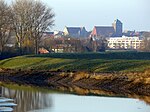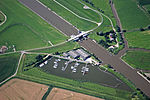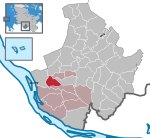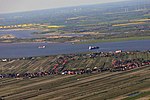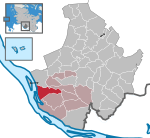Pinnau (river)
Rivers of GermanyRivers of Schleswig-HolsteinSchleswig-Holstein river stubsTributaries of the Elbe

The Pinnau is a 41-kilometre-long (25 mi) river, which flows right or northeast of the main river, Elbe. The Pinnau is therefore a tributary in the southern part of Schleswig-Holstein, Germany. The Pinnau is categorized by German Bund/Länder-Arbeitsgemeinschaft Wasser (Federal/state association water) by "flow type" as a "marshland water body". The 8.5 km (5.3 mi) lower part between the Elbe and Uetersen is navigable for Class II ships, the 10.3 km (6.4 mi) middle part between Uetersen and Pinneberg is navigable but not classified.
Excerpt from the Wikipedia article Pinnau (river) (License: CC BY-SA 3.0, Authors, Images).Pinnau (river)
Elmshorn-Land
Geographical coordinates (GPS) Address Nearby Places Show on map
Geographical coordinates (GPS)
| Latitude | Longitude |
|---|---|
| N 53.6762 ° | E 9.5455 ° |
Address
Seestermühe
25371 Elmshorn-Land
Schleswig-Holstein, Germany
Open on Google Maps


